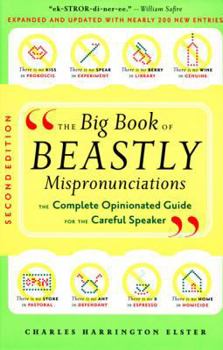The Big Book of Beastly Mispronunciations: The Complete Opinionated Guide for the Careful Speaker
Select Format
Select Condition 
Book Overview
The definitive pronouncement on more than 1,500 of our most commonly mispronounced words. From the language maven Charles Harrington Elster comes an authoritative and unapologetically opinionated look... This description may be from another edition of this product.
Format:Paperback
Language:English
ISBN:061842315X
ISBN13:9780618423156
Release Date:February 2006
Publisher:Mariner Books
Length:522 Pages
Weight:1.45 lbs.
Dimensions:1.4" x 5.9" x 9.1"
Customer Reviews
5 ratings
Passionate and Wonderful!
Published by Thriftbooks.com User , 23 years ago
Elster could be a blow-hard. He could be a nauseating pedant. Instead, he's the charmingly gnomish author of this magnificently entertaining book. Like many of us, he had a mother who would pin his ears to the wall if he dared confuse who with whom. And this guy's mom knew that "flaccid" is pronounced "Flak-sid", did you? Or how's this: try ordering a "daiquiri" (Dy-kuh-ree). Good luck; but of course you'll be correct. This very BIG book of "beastly" mispronunciations is gleefully entertaining. You won't just get the correct pronunciations, but concise reasoning on why a word crept into the language, why it should be tossed out, who corrupted it, and why we tend to garble nuclear (N(Y)oo-kle-ur), while clinging to the "psuedo-French"- ified envelope (AHN-vul-lohp). This could be nothing more than a pesky book, but Elster is so passionate about the Language, and so wildly fun that it's just great reading-- if not terminally humbling. Three distinct groups deserve this gift: Post-modernists who will turn away in horror (then read it on the sly), people who speak English, and those who find in words the delicate beauty of a very good opera-- when sung correctly.
a consequential collection for the careful speaker
Published by Thriftbooks.com User , 23 years ago
Admit it: from time to time, we all like to use a ten dollar word to demonstrate our mastery of the English language. As President W. Bush can attest, however, nothing's more embarrassing at such moments than discovering you've just mispronounced the word.To our rescue comes Charles Harrington Elster, an expert in the ways of saying words correctly. In "The Big Book of Beastly Mispronunciations," he provides not only an almost exhaustive list of frequently mispronounced words, but clear and entertaining explanations and arguments of why his pronunciation is correct.Elster has carefully researched each word, providing evidence from dictionaries, usage in broadcast media, and historical linguistics to explain why a word ought to be said in a certain way. Elster is someone who cares about the English language. The role of language is to communicate, and communication is impossible if we cannot understand one another. Thus, common pronunciation of words is significant. On the whole, Elster prefers pronunciations that have history and permanence. Many arguments for words I thought I'd been saying all along were clearly presented with his preferred pronunciation in my dictionary. He does concede in some cases that a common mispronunciation of a word has become correct, by sheer weight of usage. He also is careful to note pronunciations that differ between British and American English. He also provides the correct pronunciation of some names and places.As someone who shares Elster's love of the language, I recommend this book highly. It's one of my most-used reference books, and not just because it's stored in the guest bathroom.
excellent reference for the serious speaker
Published by Thriftbooks.com User , 24 years ago
I couldn't disagree more with the first reviewer from San Fran. Few disagree with standards for spelling, grammar, or definitions; why should pronunciation be any different? I don't agree with all of Elster's prescriptions, (yes, it is prescriptive-- is Webster's not?) but he gives well-presented reasons for all of his conclusions and admits when he's just being arbitrary. Just like bad spelling, improper speaking does and should separate the careful from the cloddish. The author openly says the book is intended as a guide to American pronunciation, so Brits and Cans need not be offended (e.g. it doesn't necessarily matter how Newfoundlanders pronounce Newfoundland-- they don't speak American English). Of course for those of the, "make a mistake often enough and it becomes correct" school of thought, it will be of no use.
It presents itself as being opinionated, and is it ever!
Published by Thriftbooks.com User , 25 years ago
I found myself roaring with laughter one minute, with chagrin the next, and occasionally rage. Some of his favorite pronunciations I would wager have never been heard, nor spoken, west of the Mississippi. On the other hand, his preference for trauma (trawma rather than trowma) made me a friend for life. By condemning nu-cu-lar and sim-u-lar, two abominations used repeatedly by my inlaws, he gave release to thirty years of frustration that I could not afford to vent.
Absolutely Wonderful! Discover the mistakes you make.
Published by Thriftbooks.com User , 25 years ago
If you care about how you sound and the way you come across to other people, you'll want this book. It's a reference you'll want in whatever room you're in. You'll discover everyday words that are being mispronounced by newscasters and, more likely, by you. At least I did. And I'm a writer who prides herself on knowing words well! This book is for the American. It gives American pronounciation that is accepted by the educated class. It disdains words that are used for effect. And if a word is right in the UK but not America it will tell you so. Words like Missouri, Vase, the days of the week, yesterday, rather, begin and hundreds more are explained. You will learn the background on the usage. You will learn how to correctly pronounce February. Now that's a challenge! This is a terrific book and I highly recommend it. If I could give it more than five stars I would! Buy it!!





